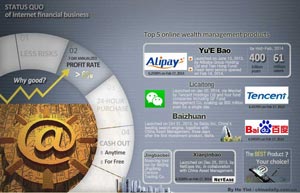China's mobile payment war escalates
(Xinhua) Updated: 2014-02-22 11:38Unavoidable war
Outright war in the mobile Internet market does not seem avoidable as consumers want to get connected all the time.
By the end of 2013, 500 million Chinese were accessing the Internet via mobile phones, accounting for 81 percent of the country's netizen population, figures from China Internet Network Information Center showed.
 |
|
 |
"This is the reason why the two firms are promoting mobile Internet products. Mobile Internet services will make people's lives more comfortable and convenient," he said.
The two have different approaches.
Alipay wins users mainly through money transfers and credit card debit payments. Tencent attracts mobile payment service users through its mobile social-networking and game apps.
"It's too early to say which will top the mobile payment market as two thirds of the market has not been developed yet," said Hu.
He said the winner will be judged on four areas essential to profit. These are the number of registered users, user activity, monthly mobile payment by the average user, and the number of merchants that accept payment via phones.
Once fully developed, China's mobile payment market will be four times as large as that of the e-commerce, Hu predicted.
Apart from cab-calling services, there is competition in personal finance products, maps, meal-ordering, social-networking apps, mobile gaming platforms as well as e-commerce.
Tencent announced on Wednesday that it had purchased a 20-percent stake in the country's lifestyle and group buying website Dianping.com.
Dianping's content, user base and offline retailer network will be integrated with Tencent's social communications platforms, to build an online-to-offline service, according to a joint statement.
Alibaba, on the other hand, has completed its acquisition of digital mapping and navigation firm AutoNavi for $1.39 billion, turning the latter into a fully-owned subsidiary.
AutoNavi will not only direct smartphone users of how to get to places but also tell them about where their favorite services and products can be found.
|
 |
 |
- Yu'E Bao deposits exceed $65.96b
- Tencent takes 20% Dianping stake
- Chinese consumers most confident in online payments
- New mobile payment platform ‘will go far’ to lift consumption
- Alipay claims to be world's No 1 mobile payment company
- Enrich your wallet via WeChat in Spring Festival
- Enrich your wallet via WeChat in Spring Festival
- Central bank drafting regulation on mobile payment
- China mulling regulation for mobile payment
- Now you can pay with the kiss of a smartphone
- Mobile payments to exceed 9t yuan in 2015
- NHTSA says finds no 'defect trend' in Tesla Model S sedans
- WTO rare earth ruling is unfair
- Amway says 2014 China sales may grow 8%
- President Xi in Europe: Forging deals, boosting business
- CNOOC releases 2013 sustainability report
- Local production by Chery Jaguar Land Rover this year
- Car lovers test their need for speed in BMW Mission 3
- China stocks close mixed Monday


















